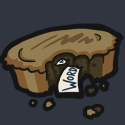|
GlyphGryph posted:I'm not saying 1-5 year olds aren't stupid and selfish, but that rests on assumptions way more extreme than anything born out by reality. I apologize, I was unclear. The kind of sharing that really young kids hate - and please keep in mind that we're talking about a gradual development from absolutes to more mediate forms - isn't the kind that they can participate in. It's rather the kind where I get the good thing, then you do, and then me again. This makes young kids furious, because they don't yet really understand the logic behind how this works, and have a poor temporal sense. He has it, I don't, and gently caress him forever. The kind of sharing where you and I play with a toy together is interesting and good. I should have been more clear. And on the second point, yes, both feelings are felt with great intensity at the same time. They can't really synthesize their contrary feelings, which adults get better at (though as you point out, this is never something we really get rid of, it's just more marked with kids).
|
|
|
|

|
| # ? May 5, 2024 19:28 |
|
Serrath posted:The works of Freud make it pretty clear that he is talking quite specifically and directly about sexual feelings; he saw the human libido as innate and present at birth. Where adults experience human libido specifically through sex, Freud conceptualized pre-mature sexual libido under a model he termed polymorphous perversity in which infants and children can derive sexual gratification through means other than adult-genital contact. It's through subsequent social conditioning, though, that children learn to derive pleasure through socially acceptable norms which culminates in typical sexual impulse by adulthood. Absent a social context, though, Freud believed that sexuality would remain disambiguated and deriving sexual pleasure through incest, various forms of touching, fetishism etc would be the norm. Where children represent the "natural" state of sexual gratification, adults represent a socially constrained and artificial state of sexuality and it is through this social limiting that psychoses develop. Freud taught that the natural state of sexual limitation created a basal level of sexual repression and thus psychoses in everyone, in children who are robbed of the ability to sublimate their polymorphic sexuality during a time when it's socially acceptable for them, you get even more adult psychoses because even more sexual repression has taken place. thank you for the good post
|
|
|
|
Numerical Anxiety posted:It's rather the kind where I get the good thing, then you do, and then me again. This makes young kids furious, because they don't yet really understand the logic behind how this works, and have a poor temporal sense. Ah, yeah, if we are just limiting sharing specifically to turn taking, that does rule out many of the situations children enjoy participating in. I would argue even then there is one notable counterexample though - food. Children enjoy taking turns with food from a young age, playing the you take a bite, i take a bite, i chew this up and spit it out to give to you to chew up, expecting you to spit it out and give it back. Although most people are likely to discourage this behaviour quickly, you can often still see it when toddlers interact with amimals, where they will often give a bite of something to the animal they very much actually want. Maybe food is a special case, or this situation isnt actually what you would consider turn taking? GlyphGryph fucked around with this message at 16:01 on Nov 13, 2016 |
|
|
|
Ew. Thanks though.
|
|
|
Knobb Manwich posted:I killed my mother and hosed my father I think that's called an electra complex
|
|
|
|
|

|
| # ? May 5, 2024 19:28 |
|
Cephas posted:How is Lacanian psychoanalysis actually used in a therapeutic environment anyway? I studied him from a lit theory perspective, and his ideas can make for compelling readings of literature. But compared to Freud or Jung, where it's easy to imagine how their ideas apply to an actual therapy session with a patient, I have no clue how it would actually go for Lacan. I might be misremembering the line, but I believe he even said something along the lines of not actually being that interested in curing people, compared to studying them. https://www.amazon.com/Clinical-Int...79382408&sr=1-2 Fink seems to be the leading authority on explaining Lacan to dummies like myself. I have The Lacanian Subject by him and liked it. There's Zizek I guess but even though I've liked some of his stuff, he seems too tangled up with politics to be the best source on Lacanian thought. IMO anyway.
|
|
|









 Can you give me some tips to prevent this from happening again with my children?
Can you give me some tips to prevent this from happening again with my children?

